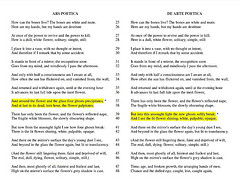The second issue of 1948 features "Poeti Inglesi e Americani," and the table of contents reads like Who's Who: with W.H. Auden, Ronald Bottrall, Lilian Bowes Lyon, Jocelyn Brooke, Hamish Henderson, Walter de la Mare, Laurie Lee, C. Day Lewis, Norman Nicholson, Kathleen Raine, Henry Reed, W.R. Rodgers, Edith Sitwell, and Vernon Watkins representing Great Britain; and Conrad Aiken, Leonie Adams, Hayden Carruth, E.E. Cummings, Owen Dodson, Richard Eberhart, Edward Field, Marianne Moore, Theodore Roethke, Karl Shapiro, Theodore Spencer, William Jay Smith, Dunstan Thompson, William Carlos Williams, and Richard Wilbur for the Americans.
Reed's contribution is an obscure poem titled "Ars Poetica," which (I was disappointed to discover) does actually turn up in the Collected Poems, as "De Arte Poetica." The poem is a long meditation on writer's block, regret, and the author's inability to reconcile his past and future. The two versions are not entirely the same, and Reed seems to have made changes following the poem's appearance in print. Jon Stallworthy, in the textual and bibliographical notes for Reed's Collected Poems, tells us:
de arte poetica (? c.1940). Text from an unidentified cutting among HR's papers, with the title 'Ars Poetae' altered as here, and with numerous (? provisional) autograph revisions in the author's earliest—i.e. 1940s—hand. Lines 53-59 are cancelled, but as no replacement lines are offered they have been restored here.
[p. 163]
So, it would seem that quaderno due of Botteghe Oscure, secundo semestre 1948, is likely the source of the "unidentified cutting" in Reed's papers, despite the slight divergence in the titles. This could easily be confirmed if the cutting displays the journal's pagination (pp. 262-64), and Kathleen Raine's "Self," on the reverse of the first page. If Reed was making revisions directly on his copy of the version published in 1948, then his amendations may have gone on into the 1950s.
I put together a quick, side-by-side comparison of the two versions of Reed's poem, with the 1948 text on the left side, and Reed's revised version from the Collected Poems on the right. As you can see, everything up to line 36 is exactly the same, he only did away with two couplets, and slightly changed the wording of another to better mate with his changes (.pdf document):
If Reed ever thought of better lines to replace those he "cancelled," they have not been found.
As a multi-lingual literary journal, Botteghe Oscure provides Italian translations of all the poets in this issue, with "Traduzioni a cura di Salvatore Rosati, A.G., Nina Ruffini, Henry Furst, e G.B", in a sort of appendix. Reed's poem is credited as being translated by "A.G." The first issue from 1948 contains an article by the critic and translator Augusto Guidi, so I think it's safe to say he managed the adaptation in Italian.
I'll close here with a few lines from Horace's Ars Poetica, which surely Reed was referencing, and probably knew by heart:
It's not enough for poems to have beauty: they must have
Charm, leading their hearer's heart wherever they wish.
As the human face smiles at a smile, so it echoes
Those who weep: if you want to move me to tears
You must first grieve yourself: then Peleus or Telephus
Your troubles might pain me: speak inappropriately
And I'll laugh or fall asleep. Sad words suit a face
Full of sorrow, threats fit the face full of anger,
Jests suit the playful, serious speech the solemn.
Nature first alters us within, to respond to each
Situation: brings delight or goads us to anger,
Or weighs us to the ground, tormented by grief....
Charm, leading their hearer's heart wherever they wish.
As the human face smiles at a smile, so it echoes
Those who weep: if you want to move me to tears
You must first grieve yourself: then Peleus or Telephus
Your troubles might pain me: speak inappropriately
And I'll laugh or fall asleep. Sad words suit a face
Full of sorrow, threats fit the face full of anger,
Jests suit the playful, serious speech the solemn.
Nature first alters us within, to respond to each
Situation: brings delight or goads us to anger,
Or weighs us to the ground, tormented by grief....









